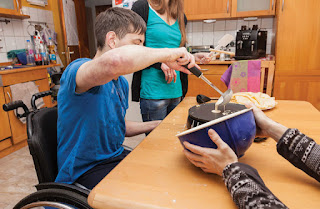What to Expect When Living in an Independent Living Program
Independent living programs are a lifeline for individuals with disabilities, offering them autonomy, self-reliance, and active community participation opportunities. For those considering such a program or family members seeking information on behalf of their loved ones, it's essential to understand what to expect when living in an independent living program.
In this comprehensive guide, we will delve into the world of independent living, exploring the services, support, and lifestyle individuals with disabilities can anticipate.
Defining Independent Living
Before delving into the specifics, it's vital to clarify the concept of independent living. Independent living is a philosophy and a movement that emphasizes the rights of individuals with disabilities to live in their communities with the same freedom, opportunities, and choices as everyone else. It's about promoting self-determination, full inclusion, and breaking down barriers that hinder equal participation.
The Core Principles of Independent Living Programs
Independent living programs are built upon a set of core principles:
Consumer Control
Independent living programs should offer control over their lives, including the services and support they receive. They are active decision-makers in shaping their destinies. This means they actively participate in planning their services, setting their goals, and making life decisions.
Self-Advocacy
Empowering individuals with disabilities to speak up for their needs and rights is crucial. Independent living centers encourage self-advocacy and provide resources for self-expression. Individuals learn to articulate their needs and preferences effectively in their daily living, employment, or community interactions.
Peer Support
Peer support is a fundamental component. Those who have experienced similar challenges can provide invaluable guidance and encouragement. Within independent living programs, individuals often form peer support networks. These networks offer a safe space for sharing experiences, challenges, and strategies for success.
Accessibility
Independent living facilities and services must be physically and socially accessible to all individuals, regardless of their disability. Accessibility encompasses everything from wheelchair ramps and accessible bathrooms to communication support for individuals with sensory impairments.
Community Integration
Independent living programs emphasize integration within the broader community. Participants engage in community activities, employment, and social events. They are encouraged to interact with neighbors, co-workers, and fellow community members, promoting inclusivity and dispelling misconceptions about disabilities.
Services and Support
Independent living programs offer various services and supports tailored to individual needs.
These may include:
Personal Assistance
Assistance with daily living activities, such as dressing, grooming, meal preparation, and mobility, is available based on each individual's requirements. Personal assistants are trained to respect individuals' preferences and promote their independence while providing necessary support.
Skills Training
Programs often provide training in essential life skills, such as budgeting, cooking, communication, and transportation. These skills empower individuals to manage their daily lives effectively, contributing to their independence.
Advocacy
Participants are encouraged to become self-advocates and may receive training to navigate systems and assert their rights. Advocacy training equips individuals to advocate for themselves and for disability rights at a broader level.
Accessibility Modifications
Housing and facilities are adapted to accommodate individuals with disabilities, ensuring accessibility and safety. Modifications may include installing ramps, widening doorways, and adding visual or auditory aids for those with sensory impairments.
Peer Counseling
Peer support specialists offer guidance, mentorship, and a listening ear to help individuals overcome challenges. These specialists often have personal experiences with disabilities, making their support empathetic and relatable.
Daily Life
Living in an independent living program involves a daily routine that encourages autonomy and responsibility. Individuals are encouraged to manage their schedules, make choices about their meals and activities, and participate in community life. This approach promotes self-confidence and self-sufficiency, enabling individuals to lead fulfilling lives.
Employment and Education
Many independent living services offer support for employment and educational goals. This may include job coaching, vocational training, and assistance with enrolling in courses or programs. Participants are encouraged to pursue their career aspirations and educational interests, breaking down barriers to employment and education.
Community Involvement
Active participation in the community is a cornerstone of independent living. Individuals are encouraged to engage in social activities, volunteer work, and advocacy efforts to promote disability rights. Community involvement enriches individuals' lives and raises awareness and fosters inclusivity.
Legal and Financial Considerations
Participants in independent living programs should be aware of their legal rights and responsibilities. Understanding financial aspects, such as budgeting, benefits, and financial planning. Some programs offer workshops or resources to help individuals navigate these complex legal and financial matters.
Overcoming Challenges
Living independently with a disability can present challenges, but independent living programs aim to address these issues effectively. Challenges may include healthcare management, transportation, and dealing with discrimination. Participants receive guidance and resources to navigate these hurdles, ensuring they can overcome obstacles and achieve their goals.
Long-Term Planning
Independent living services encourage individuals to engage in long-term planning. This may involve setting personal goals, preparing for career advancement, and planning for financial security and retirement. By fostering a forward-thinking mindset, these programs empower individuals to create a roadmap for their future, ensuring continued independence and well-being.
Conclusion
Living in an independent living center offers individuals with disabilities a chance to lead fulfilling lives with the necessary support and services. These programs embrace the principles of self-determination, community integration, and empowerment. By knowing what to expect and understanding the available services, individuals with disabilities can embark on a journey toward greater independence, autonomy, and a richer quality of life.
Independent living empowers individuals to become active, engaged members of their communities, breaking down barriers and promoting a more inclusive society for all. It is a testament to the resilience and strength of individuals with disabilities as they chart their own course toward a brighter future.


Comments
Post a Comment